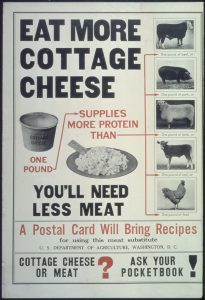 Protein (from Greek proteos= primary) is composed of amino acids which control a plethora of functions in the human body in structural capacity (i.e. muscle) and as enzymes, hormones, transporters and immunological boosters. Protein is, to put it bluntly, “responsible for just about anything” (Bier, 1999).
Protein (from Greek proteos= primary) is composed of amino acids which control a plethora of functions in the human body in structural capacity (i.e. muscle) and as enzymes, hormones, transporters and immunological boosters. Protein is, to put it bluntly, “responsible for just about anything” (Bier, 1999).
This macronutrient, revered by bodybuilders, strength and endurance athletes around the world is a crucial component to any muscle-building or weight-loss regimen.
We all know protein is good. But how much do you really need for a lean body and maximum performance? Is there a difference between animal and plant proteins and should you supplement your diet with shakes?
Time to dispel the myths (and hurt some feelings along the way).
Protein requirements of athletes and active individuals
The average, mostly sedentary Joe needs about 0.8 grams of protein per kilogram of bodyweight a day to sustain himself (that’s 64 grams of protein for an 80 kg male). An amount easily obtained with most diets.
Yeah I know, you’re no average Joe (or Jane). You train hard and eat good. Good as in you’re consciously trying to get adequate amounts of protein at each meal. But how much is adequate?
Research shows that an intake of 1.3-2 grams of protein per kilogram of bodyweight (0.6- 1 gram per pound) is ideal for maximizing protein synthesis and physical performance. An 80 kg athlete would thus need between 105-160 grams of protein per day.
Many trainees insist on eating a lot more than that though (watch this). Are there any scenarios where more is better? Does eating more protein result in more muscle gain?
Yes and no. But mostly no.
Most protein synthesis in the human body originates from endogenous amino acid metabolism (Hofmekler, 2011). It’s primarily the recycling of bodily tissue that leads to muscle gain, not the 200+ grams of protein you’re consuming on a daily basis.
Furthermore, “several studies have shown that strength training, consistent with the anabolic stimulus for protein synthesis it provides, actually increases the efficiency of use of protein, which reduces dietary protein requirements.” (Phillips, 2004)
Strength training up-regulates protein metabolism and thus makes you more efficient at utilizing protein for the repair and growth of lean tissue. Working out makes eating protein an anabolic event, not the fact that you’re eating chicken breast 6 times a day. It’s a common misconception that you need to consume a high-protein diet when you increase physical activity.
Your body requires energy to synthesize new tissue. Protein, however, represents a subpar energy source. Fats and carbohydrates are much preferred energy substrates. If muscle gain is your goal, make sure to be in a positive energy balance (at least intermittently).
Eat enough and worry less about protein intake or timing. Increase your portion sizes (esp. carbohydrates and fats) to facilitate the synthesis of lean tissue.
Protein intake and weight-loss
Protein needs increase in times of calorie restriction. When trying to lose weight, consider increasing protein intake to 2.2 grams per kilogram (1 gram per pound) of bodyweight. This will shield your lean mass from the catabolic effects of dieting.
Eating more than that will only increase amino acid oxidation and protein wasting. And while a short-term surplus of protein is not detrimental to health, I would still (strongly) advise against a very high protein diet as it indirectly limits the amount of carbohydrates and fats you eat in a calorie controlled scenario.
Deemphasize protein meals and ignore traditional bodybuilding templates. Focus instead on (training intensely and) eating balanced meals including proteins, fats and carbohydrates. You will reach the point of diminishing returns fast, following standard bodybuilding protocols. If you’re not using anabolic steroids there’s no way your body can break down and assimilate massive amounts of protein on a daily basis. Bloating, indigestion and frequent toilet sessions are pre-programmed.
When you sit down to eat, don’t concern yourself with the amount of protein you’re getting (“how much protein in those cheese nachos?”). Simply make sure to have some protein with every meal and eat sufficient amounts of calories for your goals.
I often see people stuffing themselves with meat and other high protein foods, thinking they can bypass weight-gain by foregoing carbs and/or fats. Doesn’t work. Protein is not a free-pass to overeating.
Granted, protein has the highest thermic effect of all macronutrients and is not easily converted to body-fat, but an excess of calories, irrespective of source will lead to weight gain. Doesn’t matter if you eat gluten-free zero carb protein pancakes (drenched in sugar-free syrup) or 2 extra slices of meat lover’s pizza. The overall calories will determine whether you gain or lose weight. And while it’s certainly harder to overeat on protein foods, it’s still doable, especially if you’ve been dieting for some time.
Protein Timing
There are multiple sources recommending specific protein pulse feedings or timed (pre, intra and post workout) protein consumption. Flushing the system with amino acids around your workouts makes sense in theory. In practice, however, these strategies have very little (if any) impact on long-term (!) muscle gain and performance.
Yes, you might be able to spike protein synthesis for a few hours, but the body will eventually scale it back down in order to maintain homeostasis.
I remember when I first started training (and consuming biased fitness information), I would have a protein shake immediately after waking (to jump-start anabolism) and another one post-training (to maximize protein synthesis). You live and you learn. Save yourself the money and buy some real, high-quality food. It will serve you much better.
See the guy up there in the picture? Trust me when I say he didn’t get that body from drinking protein shakes.
Protein timing, like meal timing in general, is negligible in the grand scheme of things. You won’t lose your hard-earned muscle if you skip the post workout shake or eat a late breakfast (or God forbid… skip breakfast). Simply make sure to eat sufficient protein at regular intervals throughout the day. Your body will regulate protein synthesis as needed either way.

Animal VS. plant protein and the protein combining myth
Are animal proteins superior to plant proteins?
For the sake of muscle growth and performance, yes. The difference is not in the isolated protein component, it’s in the complete nutrition you get from animal protein sources such as eggs, dairy and flesh foods.
Now, I know there are vegans out there that do just fine on a plant-based diet. But the fact that some can get away with it doesn’t mean it’s a good idea for the general population. In fact, eating exclusively plant foods will greatly undermine your physical potential (say goodbye to your androgens).
Balanced, whole food based (ovo-lacto) vegetarian diets can work very well, but once you start eliminating all animal foods you’re greatly cutting down on the nutrient variety and density of your diet.
Protein is not the issue. You can get tons of protein from plant foods alone. Beans, legumes, and some grains are decent sources of dietary protein. And contrary to popular belief, most plant foods do have a complete amino acid profile, so there’s no need to supplement your intake or combine them a certain way to enhance biological value.
However, you will be missing out on immune boosting and growth supporting nutrients and co-factors by excluding animal foods. Extremes never work. Just as eating solely plant foods, consuming excessive amounts of flesh food will compromise performance and health over time.
I know restrictive diets are all the rage these days and we like to think that in order to see results, we need to eliminate certain foods or entire food groups. But the truth is, these approaches don’t work long-term. Never have, never will.
The Verdict
Eat around 1.6- 2.2 grams of protein per kilogram of bodyweight, emphasizing balanced meals, rich in carbs, fats and proteins. As long as you consume a varied, whole-food based diet you’ll hit your protein targets without batting an eye. Shakes and supplements are money flushed down the toilet (literally).
When you run a severe deficit, you might want to consider increasing protein intake slightly. But then again, why would you run a severe deficit? (Here’s how you lose weight and keep it off).
I hope this cleared up the protein confusion and how much you really need for muscle and performance. If you have any questions or objections, let me know in the comments below.
Until then.
Thank you for reading
Victor
Resources
Antonio, J. et al (2016). The effects of a high protein diet on indices of health and body composition – a crossover trial in resistance-trained men. J Int Soc Sports Nutr. 13: 3.
Bier, D.M. (1999). The Role of Protein and Amino Acids in Sustaining and Enhancing Performance. Institute of Medicine (US) Committee on Military Nutrition Research.
Bilsborough, S./ Mann, N. (2006). A Review of Issues of Dietary Protein Intake in Humans. International Journal of Sport Nutrition and Exercise Metabolism (16): 129–152.
Gropper, S.S./ Smith, J.L- (2013). Advanced Nutrition and Human Metabolism. Cengage Learning. Sixth Edition.
Hofmekler, O. (2011). Unlock Your Muscle Gene: Trigger The Biological Mechanisms That Tdansform Your Body And Extend Your Life. North Atlantic Books. 1st edition.
Phillips, S.M. (2004). Protein requirements and supplementation in strength sports. Nutrition 20(7-8):689-95.
Phillips, S.M./ Van Loon, L.J.(2011). Dietary protein for athletes: from requirements to optimum adaptation. J Sports Sci. 29 Suppl 1:S29-38.
Tipton, K (2011). Efficacy and consequences of very-high-protein diets for athletes and exercisers. Proceedings of the Nutrition Society 70 (2): 205–14.
Young, V.R./ Pellett, P.L. (1994). Plant proteins in relation to human protein and amino acid nutrition. Am J Clin Nutr
(59) 5 1203S-1212S
[: